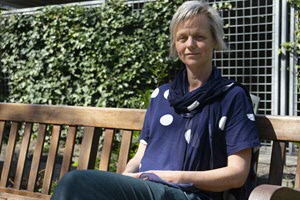Spiritual care in the earthquake zone
Loss and mourning have always been interesting to Hanneke Muthert. The topic is keeping her busy once again as she researches spiritual guidance in the event of disasters, including those in the Groningen earthquake zone. She recently organized a number of events about this topic with the Centre for Religion, Health and Wellbeing at the Faculty of Theology and Religious studies and in collaboration with the PThU (Protestant Theological University).
Text and photos: Merel Weijer
Farming crisis
A number of significant findings surfaced during the first event. One of the participants worked for the farmers pastoral care service, a service for farmers who are faced with crisis after crisis and who sometimes end up in hopeless situations as a result. It appears that the disasters they face mostly align with the Groningen earthquakes. Muthert: ‘Other disasters such as the Bijlmer and MH17 crashes definitely have an enormous impact as well – but they are one-off occurrences. We refer to what is happening in Groningen as gradual or chronic disasters. They happen constantly and you never know for how long they will continue. Soil research shows that a lot is still going on under the ground. Many people are still waiting anxiously for the next big blow.’
In its infancy
Research shows that spiritual care in the period after a disaster is still in its infancy in the Netherlands. There is a significant gap between theory and practice. Muthert: ‘You can prepare for all sorts in the case of a disaster, but in practice, it appears that people react very differently. Some people dart into action mode, while others understandably freeze.’ Another finding from research is that people find it difficult to keep themselves afloat when the disasters are long-term. This is apparent in Groningen too, among all those involved (care providers, activists and policy staff). Before sending spiritual care providers to an area where the duration of the disaster is unknown, it is important to thoroughly consider how to best support people.

Psychological complaints
Only recently have care providers from the Municipal Health Service began to connect people’s health complaints to the earthquake problems. Now, this link is becoming increasingly clear. Physiotherapists, for example, are treating more and more people who experience complaints relating to the earthquakes. But as well as physical complaints, it is also important to look at spiritual complaints. How do these disasters affect your view on the meaning of life? What do you still get out of bed for, if you can’t see any prospects? Muthert is referring to research by Tom Postmes and Katherine Stroebe of the University of Groningen, who showed that people’s health significantly declines and their feeling of safety diminishes after a disaster. ‘As a human being, you need to be able to trust that the world is a meaningful, coherent whole; that you can trust other people and that you yourself have worth. These exact factors are under pressure, and people are experiencing problems with finding meaning in their lives as a result.’ Focusing on finding meaning seems like a good starting point for all those involved.
Conversation corner
Not only are people’s individual senses of meaning affected in Groningen, but also those of the entire community. It was recently decided, for example, that half of the houses in a particular neighbourhood would be replaced with new buildings – and that half of them would not. These sorts of decisions affect the whole community. Therefore, two spiritual care providers were appointed in this area. Above all, their approach is to be ‘available’, for example by offering a conversation corner (‘Proathouk’) at a Christmas market – an initiative that was a great success. They also try to educate others about the question of meaning: how can you recognize when people are experiencing problems, and how can you best offer support? Additionally, they visit primary schools, where the children have many questions.

No talking in church
A further significant finding arose at another of the events organized by Muthert: people apparently want to share their stories about the consequences of the earthquakes, but they would rather not do so at home or at church. It seems that these spaces in particular should remain free from these discussions, as it is important to have places that are not weighed down by the earthquake topic. Muthert: ‘People are very passionate about it. While passing each other in the streets or at the Christmas market, people want to talk about their problems. But not at church.’ This knowledge has generated a new idea: the ‘talking bus’ (‘de Proatbus’). This allows spiritual care providers to easily reach people in the villages, where people can tell their stories voluntarily.
Unique research
It is important to spiritual care providers that people are able to share their stories. People don’t want to seem pathetic, but they like to have their experiences recognized – namely, that they have to wait a very long time on a solution for the problems with their houses. Muthert: ‘The fact that we are doing this research in Groningen makes it unique to the Netherlands. Never before has substantial attention been given to what this type of situation exactly does to people, what the help that is currently given actually achieves and how this could be better organized. This research will actively follow the spiritual carers.’
Slow disaster
Finally, Muthert tells a story from the documentary De stille beving (‘the silent quake’), in which a farmer was told that their farm had to be demolished. The farmer’s first question was: ‘What about the owl, then?’ For Muthert, this story asks the question of what makes a house a home. ‘If a house needs to be reinforced from the inside, then the bed may suddenly no longer fit in the bedroom, for example. People then need to turn their house into a home all over again. People suffer from that. By listening to their stories, you contribute to the processing of feelings of discontent and unrest. In this way, you can guide people and offer them support through the gradual disaster that they are going through.’
More information
| Last modified: | 12 June 2023 8.19 p.m. |
More news
-
24 March 2025
UG 28th in World's Most International Universities 2025 rankings
The University of Groningen has been ranked 28th in the World's Most International Universities 2025 by Times Higher Education. With this, the UG leaves behind institutions such as MIT and Harvard. The 28th place marks an increase of five places: in...
-
05 March 2025
Women in Science
The UG celebrates International Women’s Day with a special photo series: Women in Science.
-
16 December 2024
Jouke de Vries: ‘The University will have to be flexible’
2024 was a festive year for the University of Groningen. In this podcast, Jouke de Vries, the chair of the Executive Board, looks back.
